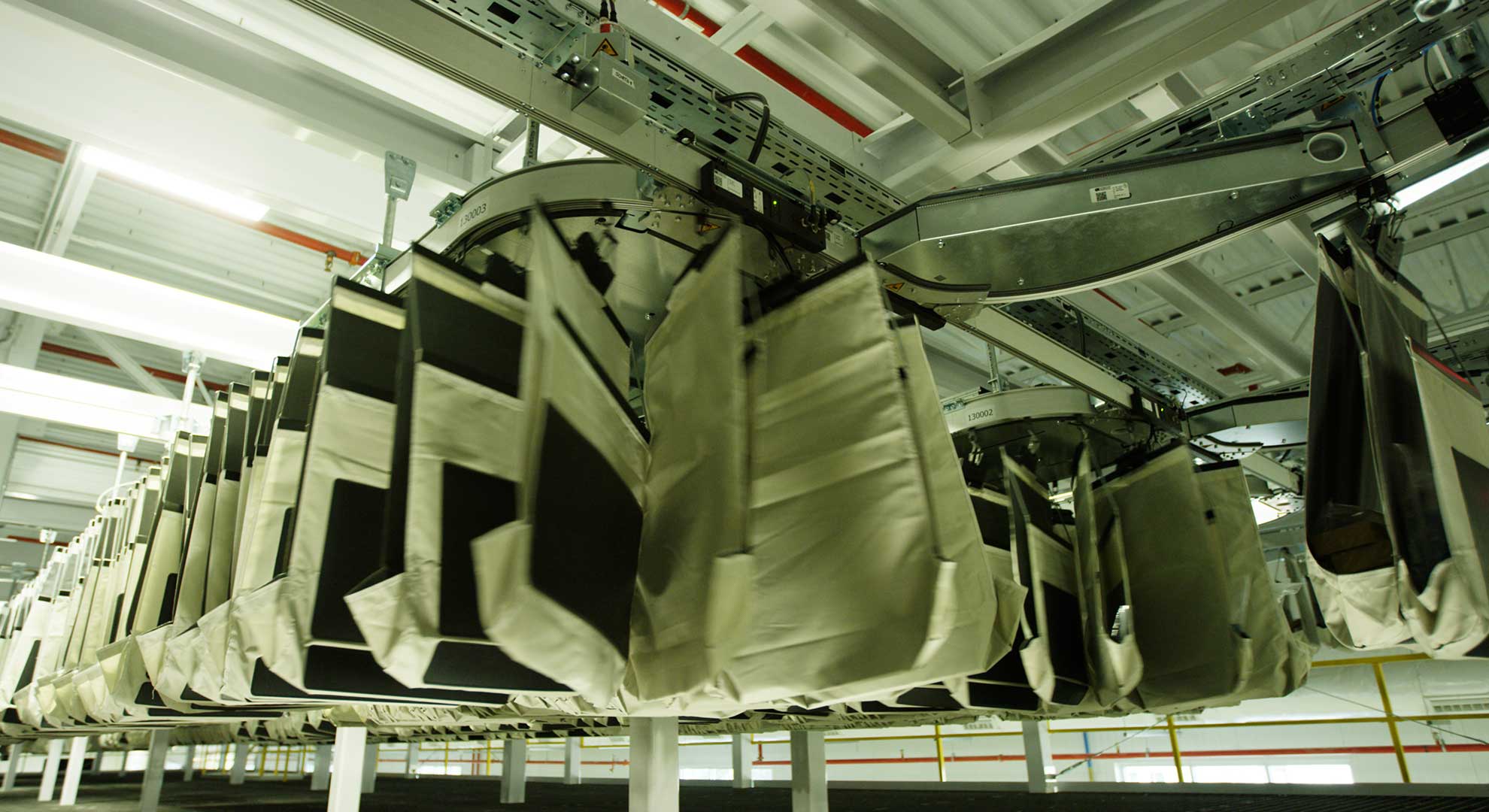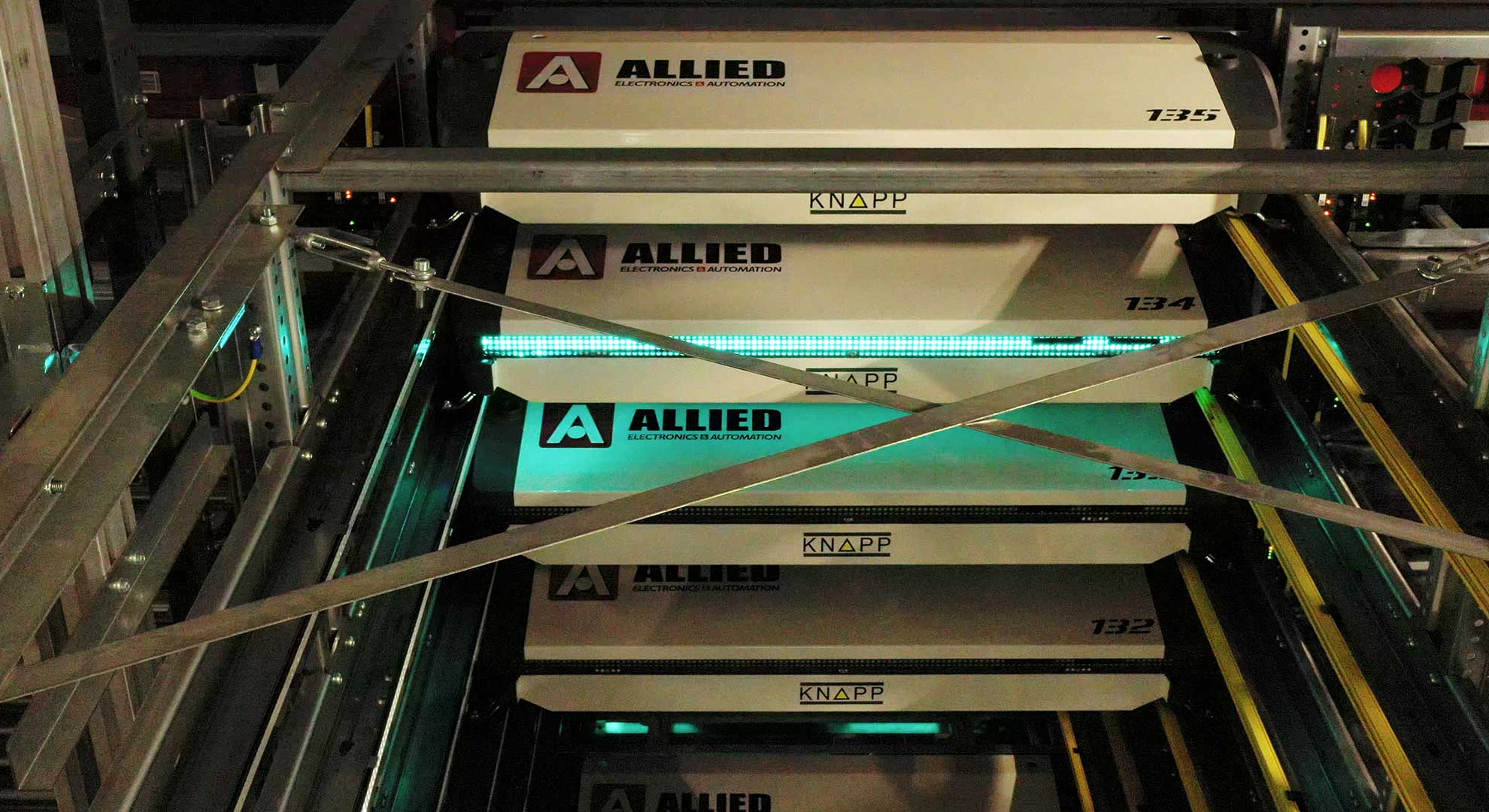Automation in the Electronics Sector: Facets of Flexibility at Allied Electronics
The decision to expand the US business unit of Allied Electronics & Automation in Fort Worth, Texas, meant setting ambitious goals. For the electronics company, the most important goal was bringing the existing distribution center up to speed with state-of-the-art technology in order to truly live up to its role as the leading supplier of electronics products. Naturally, this was a tremendous effort for the company – more so because of unexpected events. At the Fort Worth location, Allied Electronics relies on intelligent technologies for automation and digitalization.
OSR Shuttle Evo
35 goods-to-person workstations
You are currently viewing a placeholder content from YouTube. To access the actual content, click the button below. Please note that doing so will share data with third-party providers.
More InformationSuccess creates need for automation
Responsible for North America, Allied is part of Electrocomponents, a $3B (2.5 B €) global distributor of automation and control products providing access to more than 500 brand name suppliers The team of 800 employees in Fort Worth offers many different service options to handle every wish of their broad customer base. Through its website, www.thinkallied.com, the company offers more than 3 million products – a real paradise for their tech-savvy customers. Expanded search functions, expert advice and innovative visual product finders ensure that customers can find products from all industries and areas of e-commerce.
Allied’s online channel and its chances for growth have been given top priority. Scott Jayes, VP of Business Operations at Allied, sums it all up: “Our digital channel brings another level of transparency for customers. They have choice and knowledge at their fingertips to compare solution providers and what they offer.”
According to Jayes, Allied has grown continuously ever since: “About 40 percent of our business today is through our e-commerce channel, but we anticipate that it will grow to 60 percent over the next four years.” This also includes plans to double the number of products from 200,000 to 400,000 and to create storage space for 600,000 products. All these plans were implemented with the company simultaneously living up to its reputation of providing first-class service to their customers.

Efficient goods-to-person solution in combination with a pocket sorter system
To reach their goals today, the team had to expand the 18,500-square meter (200,000 ft²) system to a total of almost 47,000 square meters (500,000 ft²). The heart of the expansion is an OSR Shuttle™ Evo that, thanks to high-density storage and sequencing, now supplies a network of 35 goods-to-person work stations.
The efficient goods-to-person solution was developed in combination with a pocket sorter system, for the rapid processing and sequencing of multi-line orders handling everything from picking to automatic packing. All in all, 75 percent of incoming orders are picked, packed and shipped on the same day, meeting the special delivery dates of customers. The remaining orders involve products that are not in stock.
Do you want to learn more about logistics automation?
Get in touch with our experts today.
Digitalization and software platform
The expansion with KiSoft WMS and WCS was an important part of the automation strategy. It was developed to simplify processes and to reduce or entirely eliminate repetitive, monotonous tasks through automation. This gives the employees more time to concentrate on value-added services which are an important competitive value for Allied.
The upgrade of the existing software platform to KiSoft WMS and WCS was implemented based on a simplified integration plan. The simplified and consistent user interfaces are easily mastered by the employees and ensures that orders are efficiently planned.
What we learned about resilience
As the project approached its completion date in March of last year, the approaching pandemic made it clear that Allied and KNAPP team were facing a much bigger challenge. Project managers, technicians and commissioning teams had to work hand in hand, sometimes improvising, to create a new plan that no one had anticipated as the project began. The project had to stay on course, because Allied’s customers were companies involved in providing essential services, including hospitals, healthcare organizations and food manufacturers. All these customers needed essential products and electronic components supplied by the team at Allied.
When COVID-19 hit the US economy, the project was two months ahead with startup of the distribution center scheduled for April 2020. Having considered all the alternatives and possible effects, the team decided to continue with the project.
We definitely learned a lot about resiliency and what we can deliver under difficult conditions.
Dedication, teamwork and creativity
Scott Jayes, VP of Business Operations, and Chris Hewardine, Director of Operational Improvement, truly appreciate the foresight shown by the parent company, RS Components. Thanks to RS Components, important strategic information was passed on to the entire group. Reports about the virus and its rapid spread first appeared at the end of 2019 at Allied warehouses in China, followed by reports from operations in Italy.
“People initially thought we might be over-planning for the pandemic, but it proved beneficial, and those lessons are now part of our playbook,” explains Jayes. Measures were quickly put in place for all locations, such as mask requirements, checking for fever and other safety measures. “For testing, we had to get creative and also make it possible to work from home,” he adds.
In the end, it was all up to the employees. Finally, Jayes and Hewerdine credit Fred Martin, the KNAPP project manager, with making it possible for the team to keep up with performance under the difficult circumstances. About him Hewerdine adds, “You would think he was working for Allied.” Despite the circumstances, at a critical moment in the project shortly before their flight home, one team of KNAPP software technicians decided to stay so that the project could be completed. This was right at the time when travel restrictions were being put in place, which made it highly unlikely that a new team of software technicians would be allowed to travel to the site.

Do you want to learn more about logistics automation?
Get in touch with our experts today.

